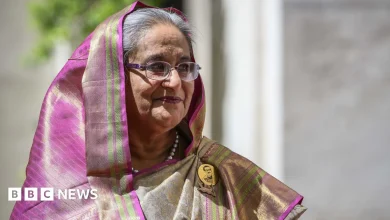Full List of Degrees Not Classed As ‘Professional’ by Trump Admin

Students doing certain degrees may no longer receive the same amount of reimbursement for their studies now that the Department of Education is implementing various measures from President Donald Trump’s One Big Beautiful Bill.
One measure coming into action is that whether a degree is considered “professional” will influence how much reimbursement a student receives for their higher education.
However, there are a number of what many see as “professional” degrees missing from the new list, such a nursing, which sparked significant concern among nurses and nursing organizations.
Newsweek has contacted the Department of Education via email outside of regular hours for comment.
Why It Matters
The costs of doing a college degree are getting higher and higher—over the last 30 years the average tuition for both public and private colleges has doubled after adjusting for inflation, according to a report by NPR.
In just the last decade, costs of undergraduate tuition in public universities have also gone up by 30 percent, according to the University Herald, and some colleges were also set to bring in 4 percent cost hikes for this academic year as well.
This means that those doing high-costing degrees, who may no longer receive the same amount as their degree may not be deemed “professional,” could financially struggle to cover the costs—which could deter students from choosing to pursue those high-demand careers.
What To Know
Under the terms of Trump’s One Big Beautiful Bill, the Repayment Assistance Plan (RAP) will be brought in to replace previous programs.
This means that the Grad PLUS program, designed to help graduate and professional students cover educational expenses, will be scrapped while Parent PLUS loans, student loans available for parents of dependent undergraduate students, will be limited.
The “new and simplified” RAP will see annual loans for new borrowers capped at $20,500 for graduate students and $50,000 for professional students.
This means that what degrees count as professional and non-professional is now a determining factor in how much financial support students will receive.
In the regulatory definition of a professional degree (34 CFR 668.2) from 1965, the text lists a number of professions, but says a professional degree is “not limited to” those mentioned, meaning it is unclear how many of the degrees not counted professional now have always been considered non-professional.
That said, the occupations not deemed professional among the health care space include nursing, physician assistants, physical therapists and audiologists, according to the education news outlet Inside Higher Ed.
Per the outlet, other professions not included are architects, accountants, educators, and social workers—which sector representatives pushed to be included in the list, given that they are high-demand occupations.
It has also been reported that engineering, a business master’s, counseling or therapy, and speech pathology will not be considered “professional” either.
Many are now concerned about the impact this will have on students training in these professions, with particular concern raised over how this could reduce the number of nurses across the country if less students decide to enter the profession over financial concerns.
The American Nurses Association has, as a result, started a petition to get the Department of Education to include nursing as a professional degree.
List of Degrees Not Classed as ‘Professional’ by Trump Admin
- Nursing
- Physician assistants
- Physical therapists
- Audiologists
- Architects
- Accountants
- Educators
- Social workers
What People Are Saying
Amy McGrath, a candidate for the U.S. Senate in Kentucky, wrote in a post on X: “Can someone explain how a theologian is considered more “professional” than a nurse practitioner? As part of the “Big Beautiful Bill” the Department of Education just proposed a reclassification of a “professional degree,” and it means fewer students will qualify for the higher loan limits they need for grad school. Programs being excluded include many fields dominated by women like health care, counseling, and social work. This isn’t a coincidence. This is a way to quietly push women out of professional careers. Limiting who can pursue advanced degrees in critical professions will only deepen the workforce shortages we’re already facing.”
American Association of Colleges of Nursing (AACN) said in a statement: “Excluding nursing from the definition of professional degree programs disregards decades of progress toward parity across the health professions and contradicts the Department’s own acknowledgment that professional programs are those leading to licensure and direct practice. AACN recognizes that explicitly including postbaccalaureate nursing education as professional is essential for strengthening the nation’s health care workforce, supporting the next generation of nurses, and ultimately supporting the health care of patients in communities across the country.”
Kevin Kinser, professor of education policy studies at Pennsylvania State University, told Newsweek: “I don’t think the point is to discern professional degrees from other degrees in terms of loan eligibility. It is to limit the exposure of the government to loans that will not be repaid, whether because of default or through public service loan forgiveness policies. So the list includes professions that generally result in high salaries, and neglect professions that have lower earnings or less prominence. The exception here is theology, which may reflect more political calculations than anything else. There is also less of a sense of using loans to encourage people to enroll in other programs from a workforce development perspective. We need nurses and teachers for example, yet loans would be unavailable to support people entering these professions.”
He added: “As a wider impact, on the positive side, it will prevent people from taking on unreasonable amount of debt for the salaries they can expect to receive in employment. It will also reduce the incentive for universities to use professional programs as cash cows and increase the pressure on affordability. On the down side, it is yet another pressure point that universities are faced with as their business models are upended by sharp breaks from previous policies. Many institutions will struggle to readjust. For institutions that value public service, such as land grant institutions, it may be especially difficult to maintain community commitments to providing relevant educational credentials when the financial support for these has been reduced or eliminated.”
Paul Gaston, a professor of English at Kent State University, told Newsweek: “There are two different issues. One is abstract, an argument about definitions: which disciplines should be regarded as “professional?” Definitions that appear contrary to common sense should be reexamined. By what conceivable standard are nursing, physical therapy, and audiology not to be regarded as “professional?” It should be obvious that nursing and allied health programs prepare students to enter the health care professions.”
He added: “But the more important issue is whether funding policies driven by specific bureaucratic definitions serve the public good. If such policies discourage or prevent students from pursuing an education to become health care professionals, American citizens will face an increasing challenge in gaining access to health care. A patient refused a hospital bed because of a nursing shortage will have little patience for discussions of definitions.”
He also said: “The abstract questions should not be ignored, and the definitions being used to allocate funding should be examined and refined. There is no lack of evidence that could fuel a good discussion. For instance, the case can be made that liberal arts programs preparing individuals for corporate leadership or legal studies or journalism should also be regarded as “professional.” But the immediate priority should be that higher education funding policies serve the obvious public good and, in this case, public health.”
Peter Lake, a professor of law, and the chair and director of the Center for Excellence in Higher Education Law and Policy at Stenson Law, told Newsweek: “There are a variety of what I have come to know as “learned professions” under other legal standards that the current administration does not consider to be professions for extended loan opportunities, notably a variety in the health care field such as nursing. A learned profession features specialized higher education training and skills, licensure requirements and accelerated accountability by the profession itself and/or legal consequences for malpractice under professional standards of care. The federal administration in my view should track more commonly held views of what qualifies as a profession under the law.”
He added: “The impacts of narrowly construing professions could include barriers to opportunities for students seeking a career in what is otherwise considered a profession under other legal standards. The private loan market might not be sufficient or sufficiently affordable especially for promising students who have faced economic challenges. There may be some pressure as well on institutions to reduce tuition; and the major question is whether doing so might result in diminution of necessary instruction and training, particularly in person. As the current administration seeks to control the costs of professional education we are all waiting to see if the goal of efficiency competes with creating a sufficient future cadre of well-trained professionals.”
What Happens Next
The new measures will be implemented from July 2026.
Update 11/21/25 8:40 a.m. ET: This article has been updated with comment from Kevin Kinser.
Update 11/21/25 10:23 a.m. ET: This article has been updated with comment from Paul Gaston.
Update 11/21/25 11:29 a.m. ET: This article has been updated with comment from Peter Lake.




